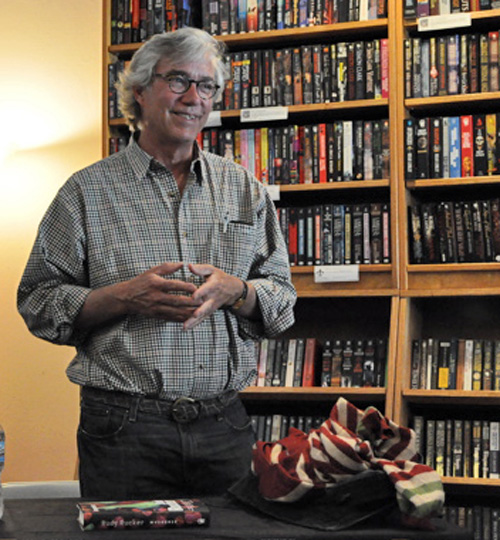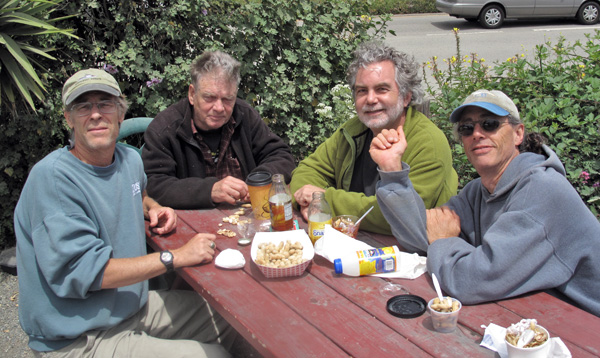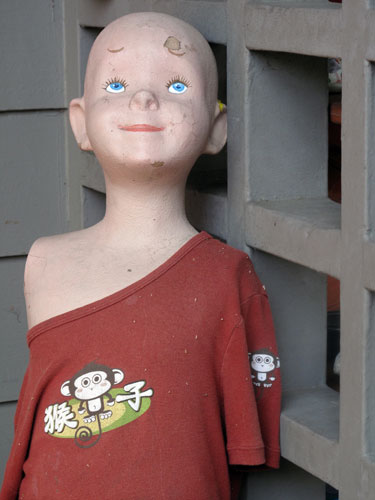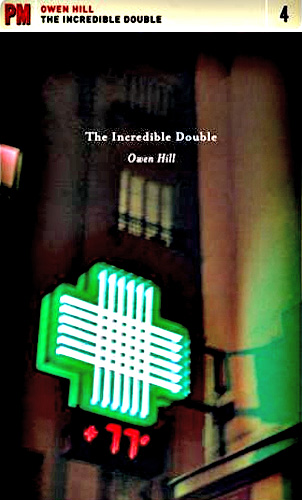
I did three readings from Hylozoic over the last few days. The picture above shows me at Borderlands Books in San Francisco, photo courtesy of Bogeon Kim.
At Books, Inc., in Mountain View, I recorded a podcast of me reading the first part of Chapter Two of Hylozoic, along with about a half hour of questions-and-answers with the friendly crowd. You can click on the icon below to access the podcast via Rudy Rucker Podcasts.
When I went to Berkeley to read at Moe’s Books, I got together with four of my SF writer friends: Kim Stanley Robinson, Terry Bisson, Carter Scholz, and Michael Blumlein. It’s good to have Terry in the Bay Area, he’s very dynamic about organizing get-togethers. I really enjoy talking to other writers about the craft and the biz—being a writer can feel like a rather lonely life.

In Berkeley, I went into Amoeba Records. There’s so few places to buy CDs anymore, it seems like. The Borders store in my home town stopped selling music and the Wherehouse music store left…and the big Virgin music store at Powell and Market in downtown San Francisco is gone.
But good old Berkeley—they’ve got Rasputin Music and Amoeba Music side by side. Looking through the Ramones holdings at Amoeba, I found an interesting little book mixed in with the CDs, shrink-wrapped and everything. Talk about targeted book marketing!

The book was Ramones, by Nicholas Rombes from the 33 1/3 line of books from Continuum Publishing, and it’s mainly an analysis of the first album by our boys, an album called Ramones. Rombes makes the point that one aspect of punk was a quality of self-awareness and irony about the media we work with. He says Ramones was “…one of the first pop albums to recognize the artifice of pop culture while simultaneously glorying in it.”
To me, that’s a good description of the attitude I’ve had about writing my SF novels, ever since I started in 1978.
One more good line from the book: “In [a] sense, the Ramones’ career is about creating the conditions under which their music would be retrospectively accepted.”

Speaking of books, Owen Hill, a writer who works at Moe’s, gave me a copy of his great short novel, The Incredible Double. It’s a fast-paced, wonderfully written noir novel, very much in the style of Raymond Chandler, but retooled for 21st C Berkeley. It’s full of tasty little local touches about the town and its denizens. And it has a wild SF-like ending—and a touch of poetry: “Oddly green haloes surround summer love, my skeleton has gone on vacation.”
Fast, short and tight. And now for a word from our sponsors.
Jackie is a punk, Judy is a runt
They both went down to Berlin, joined the ice capades
And oh, I dont know why, oh, I dont know why
Perhaps they’ll die, oh yeah, perhaps they’ll die, oh yeah
Perhaps they’ll die, oh yeah, perhaps they’ll die, oh yeahSecond verse, same as the first — Jackie is a punk, Judy is a runt
They both went down to Berlin, joined the ice capades
And oh, I dont know why, oh, I dont know why
Perhaps they’ll die, oh yeah, perhaps they’ll die, oh yeah
Perhaps they’ll die, oh yeah, perhaps they’ll die, oh yeahThird verse, different from the first — Jackie is a punk, Judy is a runt
They both went down to Frisco, joined the SLA
And oh, I dont know why, oh, I dont know why
Perhaps they’ll die, oh yeah, perhaps they’ll die, oh yeah
Perhaps they’ll die, oh yeah, perhaps they’ll die, oh yeah









June 13th, 2009 at 5:04 pm
I’m still waiting for Hylozoic to arrive in the post… arrghh!
– – –
The Roger Corman/Ramones film “Rock n Roll High School” is great fun,
with the Ramones looking and sounding their best. And PJ Soles finding Dee Dee in her shower!
I’d say the movie also “recognize(s) the artifice of pop culture while simultaneously glorying in it”
My Top 3 Ramones tracks
1. Pinhead
2.I Wanna be Sedated
3. I Remember you
Punk Rock for me really was a Phase transistion in music. I remember early 1977 and the 1st Punk song I heard
was “White Riot” by the Clash, I thought something was wrong with the Radio.
Saw the Ramones later that year, brillaint!
June 13th, 2009 at 10:22 pm
Hey Rudy, I just listened to your reading at the bookstore and your talk afterwards and the answering of questions. You gave good answers to the questions and the book and books you commented on sounded interesting. Good luck in getting this present one you are working on published and I hope that it does really well. I’m thinking maybe your work is too far ahead of it’s time for others to realize it is out there, which may be exactly how it is supposed to be. Loved watching the colorful graphics while listening to you read.
June 16th, 2009 at 8:19 pm
While you’re waiting for _Hylozoic_ you can (re)read _White Light_. As just one example of the things beautifully done, there’s a noir riff of several chapters, set in the transreal town of Truckee, where Rudy noirs with the noiriest.
Take the fight scene at the end of Ch. 17. Even reading Chandler, who actually been in a lot of violence in WW1, you end up wondering if he’d ever actually been anywhere near a street fight. Rudy makes it sound like he’s taking the gun away from two bit punks all the time, and gives you that feeling.
June 19th, 2009 at 3:27 pm
yur face popped up on facebook – yu should go the jubilee ARF – Zappanale 20
June 13th, 2010 at 12:43 pm
Qualification: I spent most of my teens obsessing about the Ramones… I’m a big fan.
I think it is a mistake to mythologize an artist’s intent. I think it’s an even bigger mistake to do so when the artist is already as heavily mythologized as a band like the Ramones. Yes, they were ground breaking. Yes, they were genre defining. Yes, their later albums were very premeditated. But that first album…?
I don’t hear a band thinking 20 years ahead. I *do* hear a group of guys that were in love with Iggy Pop. I hear young men wanting a voice as powerful as that of their hero. I do not hear them, “creating the conditions under which their music would be retrospectively accepted.”
Perhaps I need to read the book… Perhaps I am taking it out of context… Perhaps I just don’t like the idea of anyone saying that one of my favorite albums was that manipulative, and that in loving it, I am the one being manipulated.
June 13th, 2010 at 1:20 pm
Siding with Gypsy; “creating the conditions under which their music would be retrospectively accepted” sounds very suspiciously like what Harold Bloom referred to as being a “strong poet” in The Anxiety of Influence, and ever since that book, there’s been a cottage industry in trying to attribute to Chaucer, Shakespeare/Marlowe, Milton, Wordsworth, or Eliot the intent of reshaping all of English poetry so that their works would be central to it (and hence “great.”) Imagining someone able to do that requires some strange kind of clairvoyance or the ability to run multiple esthetic experiments or any number of other preposterousnesses; whereas the idea that now and then an artist or group of artists hits on an extremely contagious sign-system that proves to be so versatile and catchy that everything is shaped like it, or in response to it, seems like the most likely explanation.
Or in short, I think the Ramones were great (and they sure were — Teenage Lobotomy and He’s Gonna Kill That Girl are my eternal relistenables) but not because they set out to reshape rock, but because they wrote stuff that hit a lot of receptor sites and spread like a cold in a bus station. And in retrospect, we say “How could they have done that without meaning to?”
June 13th, 2010 at 2:40 pm
Or…
To put it (much) more succinctly…
We could just quote Mr. Jagger and Mr. Richards:
“…it’s ONLY rock ‘n roll but I like it, like it, yes, I do…”
June 13th, 2010 at 4:46 pm
I’m second to none in love and admiration for the Ramones. They’re my heros, and along with the underground cartoonists and Thomas Pynchon, are primary influences on my writing. I went to see them play live about ten times.
The reasons I like that quote, “In [a] sense, the Ramones’ career is about creating the conditions under which their music would be retrospectively accepted,” is because I sometimes like to imagine that something similar is/has been/will be true about my own career as a writer. I work in a somewhat narrow and hidebound genre and I try to make it new.
See my essay “What Is Cyberpunk?” for more thoughts (near the end) about the Ramones.
June 13th, 2010 at 5:25 pm
Different strokes and perhaps caused by different lives; coming out of a theatre background, I tend to see a lot more good stuff happening organically, without the intent to have it happen as it happens (only to do the craft so it comes out good, figuring if it happens to be something good and unusual, it can gain influence that way). But I’ve gotten the occasional thought of “I wonder if a story could be …” and written a story to see if I could make it do that, and obviously the real success of a story on that basis is that at the end it turns out not only to be a story of that kind, but a good story of that kind.
At one extreme, I just don’t think Shakespeare was trying to write the definitive Revenge Tragedy when he wrote Hamlet, because there had been at most four RT’s before Hamlet, there were about 50 after, and the category wasn’t invented until the 1880s, in retrospect. At the other, T.S. Eliot pushed the idea of a literary canon awfully hard — and then did everything he could to make his work fit into “the literary canon” if such a thing had existed per se. And he and many of his acolytes really did create the idea of canonical literature among lit profs (so much so that like Scottish tartans and Wicca, there are now people pretending it was always there), and definitely got himself included.
As for rewriting the music after it got old and stale, I’ll grant the Ramones had means, motive, and opportunity, and used’em like mad. I’m just not convinced we can make a charge of premeditation stick.